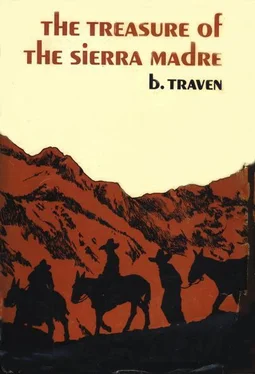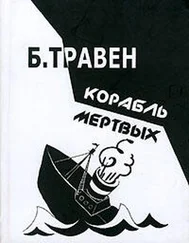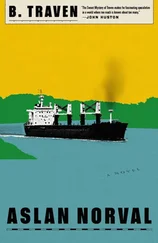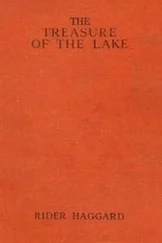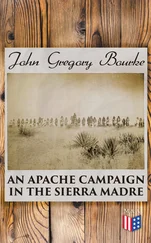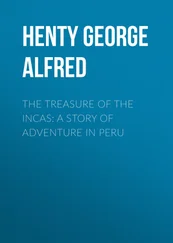Бруно Травен - The Treasure of the Sierra Madre
Здесь есть возможность читать онлайн «Бруно Травен - The Treasure of the Sierra Madre» весь текст электронной книги совершенно бесплатно (целиком полную версию без сокращений). В некоторых случаях можно слушать аудио, скачать через торрент в формате fb2 и присутствует краткое содержание. Год выпуска: 1935, Жанр: Вестерн, на английском языке. Описание произведения, (предисловие) а так же отзывы посетителей доступны на портале библиотеки ЛибКат.
- Название:The Treasure of the Sierra Madre
- Автор:
- Жанр:
- Год:1935
- ISBN:нет данных
- Рейтинг книги:3 / 5. Голосов: 1
-
Избранное:Добавить в избранное
- Отзывы:
-
Ваша оценка:
- 60
- 1
- 2
- 3
- 4
- 5
The Treasure of the Sierra Madre: краткое содержание, описание и аннотация
Предлагаем к чтению аннотацию, описание, краткое содержание или предисловие (зависит от того, что написал сам автор книги «The Treasure of the Sierra Madre»). Если вы не нашли необходимую информацию о книге — напишите в комментариях, мы постараемся отыскать её.
The Treasure of the Sierra Madre — читать онлайн бесплатно полную книгу (весь текст) целиком
Ниже представлен текст книги, разбитый по страницам. Система сохранения места последней прочитанной страницы, позволяет с удобством читать онлайн бесплатно книгу «The Treasure of the Sierra Madre», без необходимости каждый раз заново искать на чём Вы остановились. Поставьте закладку, и сможете в любой момент перейти на страницу, на которой закончили чтение.
Интервал:
Закладка:
Hearing the magic word Tuxpam, Dobbs jumped at the idea of going with Moulton to visit the oil-fields, where there might be something doing.
It is not easy to go down to Tuxpam with no money. Half of the way down is a road on which occasionally you may meet a car; the other half of the way is a big lake, and the motor-boat is not accustomed to accommodating hitch-hikers. You have to pay or you stay behind.
Of course you may go ‘way round the lagoon. But there is hardly any road at all, and this route may take two weeks. You can visit a larger number of oil-fields, however, and it was this long overland route that was chosen by the two men.
First the river had to be crossed, at a charge of twenty-five centavos. They preferred to save that money for better use, so they waited for the Huasteca ferry, which takes people across the river without any charge. This ferry crosses the river only when it has enough freight to make the trip worth while. It is meant for the company’s working-men and their families exclusively.
Dobbs and Moulton started out in the morning right after they had had a cup of coffee and some dry bread. On reaching the ferry they asked the boatman when he thought the ferry might cross. He said he probably would not be ready until eleven, so there was nothing to do but wait.
This part of the river-bank was a lively spot. A few dozen motor-boats and half a hundred row-boats waited for customers to be taken to the other side of the river. Speed-boats carried the big oilmen and other business men who were willing to pay special fares. Working-men and small traders and peddlers had to wait until a taxi boat had enough passengers to take them for the regular taxi fare. The place looked like a fair, for people who had to wait were buying fruit, lunch, shirts, cigarettes, guns, ammunition, hardware, leather goods.
The boats and ferries ran day and night. On the other side of the river were the hands, on this side of the river was the brain. Here on this side were the banks, the headquarters of the oil companies, the rich stores, and the gambling-halls and cabarets. On the other side of the river was the hard work; here on this side, in the city, was the recreation from work. On the other side of the river the oil was practically without any value. All the value the oil finally had in the market was put into it on this side of the river. Oil, like gold, is worthless in its natural state. It obtains its value only by handling and being taken where it is needed.
Many millions of dollars were carried across the river; not in coins or in notes, not even in checks. These millions of dollars were carried often in short lines and figures scribbled in a notebook. A certain tract of land worth two thousand dollars yesterday is worth today five hundred thousand dollars. For this difference a geologist was responsible, one who maintained that this tract of land was a sure shot to bring in a dozen gushers. Next week the same tract may go begging for five hundred dollars, and its actual owner may not be able to buy himself a fifty-cent lunch in a Chinese cafe, because six other geologists have staked their reputations on finding that the tract is as dry as an old picture-frame. Two months later it may be impossible to buy the same lot for twenty-five thousand dollars in cash.
It was noon when Dobbs and Moulton reached the opposite bank of the river, which was crowded with tankers coming from or going to all parts of the world. Here the banks were lined with huge oil-tanks belonging to a dozen different oil companies.
The fair on this bank was even more lively than on the other side, and it was more varied, for the small merchants doing business here catered not only to the natives, but also to the officers and sailors of the ships lying at anchor. Not only parrots and monkeys were for sale, but lion-and tiger-skins, lion and tiger cubs, snakes of all sizes, young alligators, and huge lizards. Sailors could take these animals home and tell the girls how they fought and killed the tiger to catch the tiger kitten as a present for the girl back home.
The air bit into your lungs because it was filled with poisonous gas escaping from the refineries. That sting in the air which made breathing so hard and unpleasant and choked your throat constantly meant that people were making money—much money. Unskilled labor was getting fifteen pesos a day, and Americans and Mexicans alike were spending five thousand dollars a night without giving a thought to where it went. Tomorrow there will be heaps more money. No doubt this will go on for a couple of hundred years. So why worry? Let’s spend it all while the spending is easy and pleasant.
Farther down the river were the saloons, the cabarets, and long rows of shacks where girls, gayly dressed and more gayly painted, were waiting for their sailor friends, officers and crew. All was love, song, and oceans of liquor wherever you cast a look. Mother cannot always go with the sailor boy to watch out for him. Certain trips are better made alone.
Seeing so many jolly sailors hanging around because their ships had hoisted the red flag which indicated that they were taking in oil, Moulton had an idea. He said: “It’s noon in this part of the world. What say? Let’s hop on this tanker here. Maybe there’s some dinner coming. I could take it, buddy.”
There were two men with no shirts or caps on standing before a fruit-seller and trying to make him understand that they wanted bananas and asking the price.
Moulton was right at them: “Hi, you mugs, what’s doing? What can are you on?”
“ Norman Bridge ,” came the answer, “and what of it?”
“That’s good. How about some eats?” Moulton asked. “We have a damn long way to walk, and in this tropical heat, too. So you guys’d better come across with a good man-sized meal, or, hell, I’ll sure tell your grandmothers back home that you meant to let two Ams starve out here, and in foreign country, too.”
“Aw, gosh,” said one of the sailors, “don’t talk so much squabash. It makes me sick hearing you. Come up, you two beachers, and we’ll stuff your bellies until they bust. We throw it away anyhow. Who the funking devil can eat a bite in this blistering heat? Gee, I wish I was back in that ol’ Los An, damn it.”
When they left the tanker, they couldn’t walk very far. They lay down under the first tree they reached.
“That was what I call a square meal, geecries,” Dobbs said. “I wouldn’t walk a mile even for an elephant tooth. I’m out for the next two hours. And we better get a rest.”
“Okay by me, sweety.”
They snored so loudly that people passing by and not seeing them under the tree got frightened and hurried away thinking a lion had overeaten and was taking a nap.
Moulton woke up first. He pushed Dobbs in the shoulders and hollered: “Hi, you, get up! And what about us going to Tuxpam? Let’s hustle before it gets dark.”
With much whining and moaning over the sorrows of human life they got going.
They went up the river on the right shore. The whole road, an ugly dirt road at that, was covered with crude oil, it seemed to break through cracks and holes in the ground. There were even pools and ponds of oil. It came mostly through leaks in the pipes and from overflowing tanks which were lined up on the hills along the shore. Brooks of crude oil ran down like water into the river. Nobody seemed to care about the loss of these thousands and thousands of barrels of oil, which soaked the soil and polluted the river. So rich in oil was this part of the world then that the company managers and directors seemed not to mind when a well which brought in twenty thousand barrels a day caught fire and burned down to its last drop. Who would care about three or four hundred thousand barrels of oil running away every week and being lost owing to busted pipe lines, to filling tanks carelessly, or to not notifying the pumpman that while he has been pumping for days, sections of the pipe lines have been taken out, to be replaced by new ones. The more oil is lost, the higher the price. Three cheers, then, for broken pipes and drunken pumpmen and tank-attendants!
Читать дальшеИнтервал:
Закладка:
Похожие книги на «The Treasure of the Sierra Madre»
Представляем Вашему вниманию похожие книги на «The Treasure of the Sierra Madre» списком для выбора. Мы отобрали схожую по названию и смыслу литературу в надежде предоставить читателям больше вариантов отыскать новые, интересные, ещё непрочитанные произведения.
Обсуждение, отзывы о книге «The Treasure of the Sierra Madre» и просто собственные мнения читателей. Оставьте ваши комментарии, напишите, что Вы думаете о произведении, его смысле или главных героях. Укажите что конкретно понравилось, а что нет, и почему Вы так считаете.
